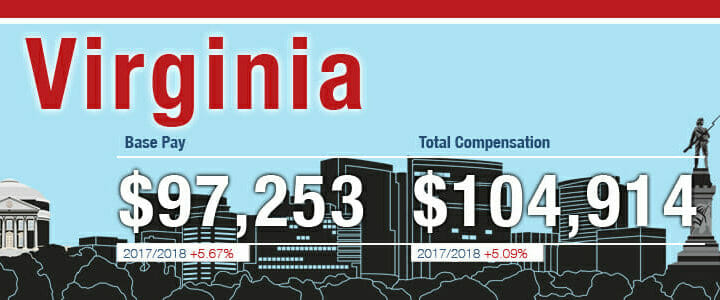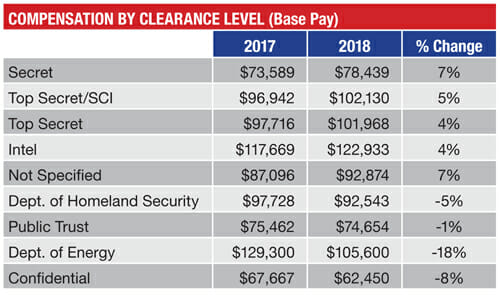When the world thinks of Virginia, they might call to mind the picturesque Shenandoah Valley, Civil War battlefields, or Monticello, the stately home of Thomas Jefferson. But as most security clearance holders will tell you, there is another Virginia altogether: the traffic-filled realm of Northern Virginia. And while the cities surrounding Washington, D.C. may enjoy a disproportionate amount of congestion, they also hold a disproportionate number of the state’s security-cleared jobs.
According to the findings of a recent ClearanceJobs report on the state of salaries for security-cleared professionals nationwide in 2018, Virginia stands out among the pack. It currently has the highest mean base salary in the country at $97,253, and the highest mean total compensation at $104,914. According to research from the Fuller Institute released in August, Northern Virginia added approximately 26,800 jobs in the one-year period that ended this past June. About 5,700 of those positions were in the professional and business services category – that includes federal contractors.
Unfortunately, this fertile job market is mostly confined to the D.C. suburbs of Northern Virginia. “Virginia is doing well, but it is driven largely by Northern Virginia where there are those tech firms as well as government contractors,” said Andy Bauer, Senior Regional Economist at the Baltimore branch of the Richmond Fed.
“What we’ve seen overall is that the cities are outperforming rural areas,” Bauer told ClearanceJobs. “We’ve seen that job growth was around 1.9% in Northern Virginia, while that state as a whole was about 1.6% – the latter on par with the national average.”
Virginia Salaries by clearance level
According to the 2018 ClearanceJobs Compensation survey results, total compensation for all surveyed security-cleared professionals worldwide is $93,004. Now, while Virginia does have the highest salaries for security-cleared professionals, that’s not the whole story. Base pay is up about 5% – but that is actually lower than the summary mean base pay increase of 8%. This suggests that there is a flattening effect on salaries in the Old Dominion State.
However, the proportion of intelligence professionals also increased by 2%, and that has put upward pressure on salaries in the state. This makes the flattening effect even more notable. Of course, salaries are also dependent on the employees’ polygraph status.
The numbers get more interesting when one looks at how the main base pay for senior level career professionals has increased by 10%, while mean base pay for senior executives increased by 9%. This is contrast by the mean base pay of mid-level career professionals, which only increased by 2%. Mean total compensation for senior-level career professionals and executives increased by 8-9%.
As the cleared workforce has dwindled, recruiters have faced another challenge, namely competition from a strengthening commercial sector. In May, the unemployment rate reached 3.8%, which is the lowest figure since December of 2000.
“The tight market is really driven by two things: the experience creep and the security clearance creep,” said John Shaw, Research and Strategic Initiatives Manager at the Northern Virginia Technology Council. “There are experience requirements within the contract itself.”
Those requirements often drive the competition among contractors for mid-level experience, Shaw added.
Competition for Cleared tech employees is fierce in Virginia
There are numerous IT and cybersecurity-related opportunities in Virginia today, but this sector nationwide continues to face shortages of workers. To drive that home: There are currently 12 or more open positions for each worker.
“The federal government continues to find that it must modernize and secure the aging IT infrastructure that government agencies often use to keep our country safe and serve citizens,” said Lykia Law, Senior Recruiter at advanced technology company Sevatec.
“Because the government cannot find and hire enough specialized professionals for these needs, government contractors and other companies provide these services in information technology, software development, cybersecurity, cloud migration, engineering, data analysis, logistics, and more,” Law told ClearanceJobs.
employee shortage is driving entrepreneurship and job creation
“These market demands have fostered entrepreneurship in Virginia, with new government contracting companies emerging rapidly, to compete for government contracts that fulfill these needs,” she added. “Because of Virginia’s business-friendly environment, the highly educated workforce, and top notch educational institutions, a large number of government contractors are clustered in northern Virginia, and competition is fierce – both to be awarded government contracts, and to hire and retain talent,” says Law.
When government contracts are awarded, companies often ramp up to hire for a specific contract need. Currently Northern Virginia has a very competitive market when it comes to salary and hiring, and government contracts drive intense competition to find the best and the brightest.
“Virginia also has some insulation through times of recession in the economy because of the federal government’s continuing need for services,” said Law. “People often ‘transplant’ to Virginia because they are attracted to the abundance of jobs and the competitive salaries. The state has been known for low unemployment rates for many years.”
aerospace industry soars in virginia
Aerospace has also seen job creation in Virginia. According to data from the Aerospace Industries Association, the aerospace and defense workforce supported more than 53,000 individuals in 2017 – including 27,200 in direct employment and another 26,270 in supply chain employment. Virginia’s share of the national aerospace and defense workforce was 2.2%, and its five-year employment growth rate (2012-2017) was 12.4%. The annual wage of an aerospace employee (which includes those not holding security clearance) was $86,111.
MAG Aerospace, a private surveillance and reconnaissance services provider, announced in August that it was relocating its headquarters from Sterling, Virginia to nearby Fairfax. The company, which will receive a $500,000 grant from the Commonwealth’s Opportunity Fund for keeping its HQ in the Old Dominion State, also announced that it would invest $5.5 Million in the development of its new corporate offices and create 120 new jobs.
That news came just months after Rolls-Royce North America also announced that it would add 100 jobs to its Virginia manufacturing plant in Prince George County, which opened in 2011.
Smooth sailing for job-seekers, but rough seas ahead for recruiters
However, Northern Virginia-based Northrop Grumman said in June it would have to lay off 348 employees as a 13-year IT deal with the state came to a close. Northrop Grumman has worked with the Virginia Information Technologies Agency since 2005. The $2 Billion contract to oversee the state’s technology infrastructure was terminated effective August 17.
The tight job market has also been affected by the fact that there simply aren’t enough cleared workers to fill the openings at these companies.
“The issue is that in many cases, you have more jobs than cleared people,” noted Jan Johnston Osburn, Vice President of Strategy and Execution at Virginia-based staffing company Lewis Price. “The unemployment rate is also low, so most people are employed. There just aren’t a lot of job seekers hanging around out there.”
At least for now, recruiters need to be prepared for an uphill battle to find the talent they need.
This article is one in a series based on the 2018 ClearanceJobs Compensation Survey. This survey was administered online between October 30, 2017 and February 9, 2018. Participants had to have a current, active federal security clearance and be currently employed to be included in the results, which included 20,883 usable responses.






